It was the stillest of days, with no hint that bad news was barrelling towards me to crack my life in two.
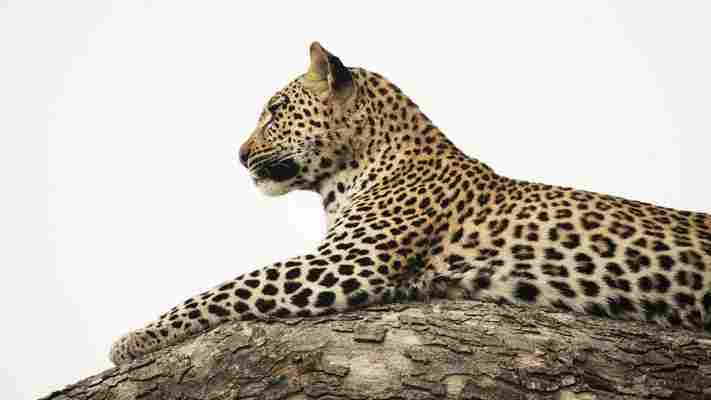
I had just settled back at our campsite with coffee and a handful of rusks, South African sweet biscuits. I was on a safari and reporting assignment in Botswana’s Okavango Delta, and after a morning hike, I paused to take stock of all I had seen. Bursts of yellow stockroses, baboons in lotus position, four-toed footprints on a hippo path, swooping bee-eaters with lime-green jackets. It was a lot of beauty for one morning.
Two days prior, our guide Simon Byron had steered me here with my photographer colleague Felix Odell, through swampy channels lined with papyrus reeds. We were deep in the labyrinth of the wetland, sleeping in tents pitched on the banks of obsidian-black water.
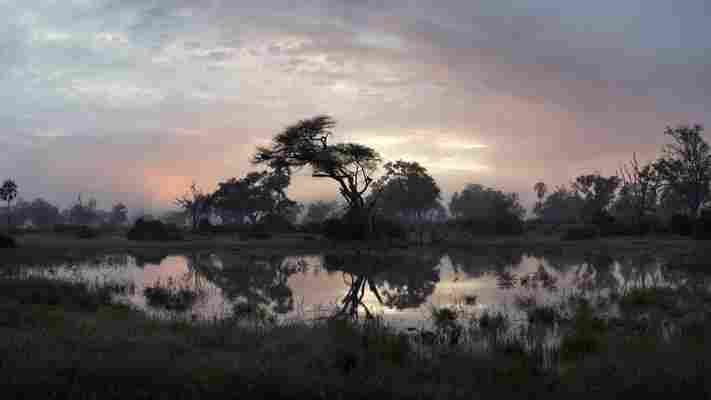
Writer Marcia DeSanctis was on assignment in Botswana when she received devastating news from home (Credit: Felix Odell)
This was my second leg of a three-part expedition across the Okavango Delta. The first had been high luxury, dawn-to-dusk game drives and the singular thrill of wildlife sightings. It was the end of the rainy season, and animals were plentiful, contentedly feasting on spring grass. Elephant and giraffe calves wobbled next to their mothers, and tiny warthogs skittered behind their parents. The savanna pulsed with life, as if warm blood, rather than water, coursed through the floodplains. The only empty space on my checklist was a leopard, the stealthiest predator of all, and the one I most longed to see in Botswana.
You may also be interested in: • A wetland oasis amid desert lands • A trip most people wouldn’t dare do • The islands of unbridled imagination
This next portion of the journey was about immersion in unspoiled wilderness, and with no electronics to ruin the quiet, I already felt my soul was recovering from something. The scent of wild sage, jasmine and basil blew across the grasslands, and I wondered if they were some kind of narcotic, so deep was my sense of calm. Byron reported hearing the distant leopard call in early dawn, but these elusive creatures were unlikely to pass by our open-air camp. I had a few more days in Botswana, so I still felt unrushed.
Later that morning, Byron received a message. We were two planes and a boat away from a mobile phone tower, so a satellite phone was our only means of communication. “You need to call home,” Byron told me softly. Another time, morbid fantasy would have clouded my vision, made me frantic that something happened to one of my children. But I instinctively knew why I would now measure time from the fractured hush of this morning.
Finally, a voice pinged back to me from outer space. “She passed away peacefully,” my husband said. “Her suffering is over.” The call cut off sharply and I stared at the handset in my palm.
“My mother is dead,” I thought. And I was clear across the world.
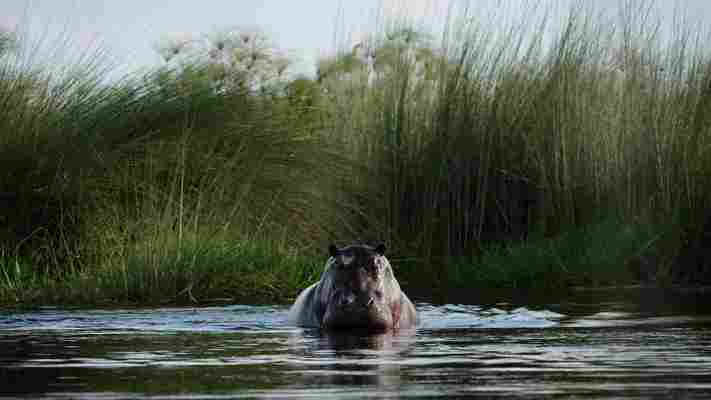
DeSanctis visited Botswana’s Okavango Delta during the rainy season when the savanna pulsed with life (Credit: Felix Odell)
I had seen her in Boston barely a week earlier. New England was bracing for a late-winter blizzard, and as I prepared the usual ritual of stocking up on coffee, wine and popcorn, my father called. In two days, I was due to leave Connecticut for Botswana. “Mom has declined,” he said. “I wanted you to know.”
“I’ll be right up,” I said and headed north to Massachusetts, straight into the storm.
My mother was approaching her fourth year at an Alzheimer’s facility. For an illness marked by mercilessness, hers was unusually tragic. She had no intelligible language and seemed to be in a state of mortal terror. She lashed out at me, the youngest of her four devoted daughters, and often at others. Did she know me? I certainly hope not. There was nothing like recognition, even less of love. It was living death and I had lost her long ago.
I’ll find you a leopard – promise
It was warm in her little room. My father, one of my sisters and I played music she loved. I dipped a swab in lemonade and laughed when she bit down hard on it like a child with a lollipop. I narrated stories about her grandchildren. Her beauty had returned in this liminal state. Her face was smooth, her colour rosy. Meanwhile, Massachusetts had all but shut down. We were socked in for two nights and slept on mattresses near my mother, cocooned by 29in of snow outside.
My father, a physician, was not optimistic that she would wake, but this enigmatic disease was rife with trickery, and there was no way to predict what any day would bring. These dips had happened before, and I had said ‘goodbye’ every time I left her in the past four years. My family urged me to go forth to Africa for the work I loved. My own justification was simple: I did not actually believe my mother would die.
“See you in two weeks, Mom,” I whispered. “I’ll find you a leopard. Promise.”
Despite her mother’s worsening condition, DeSanctis’ family urged her to travel to Botswana as planned (Credit: Felix Odell)
My mother was a natural-born wayfinder who never needed a map. In another era, she could have led an expedition down the Amazon, but instead spent her decades as a stay-at-home wife and mother. But after her children left home, travel answered the call of her restless, curious mind. Her favourite journey was a safari in Kenya with my father, where she saw all but a leopard – a ‘ leppid’ she called it in her Boston brogue. She loved those gorgeous cats, and was fascinated by the litheness of their movements, their strength and don’t-mess-with-me cool.
And now, it was unfinished business. I owed her at least that. I had been absent at her deathbed, and I wondered if the wound of my guilt could ever heal. But I was also in Botswana to work, and grief began to paint unexpected colours on my assignment.
Byron and Odell waited for me at the fire. I was numb. “My mother,” I said.
“What would you like to do?” Byron’s face was warm with compassion. We climbed into the boat and into the tangle of water and wilderness. The universe has ways of offering comfort, and it was deploying them at every turn. Such signs are visible only to the willing, and the sheer aliveness of Botswana was gracefully preparing me for loss. The delta teemed with lilies and flamboyant birds. As if my eyes were telescopes, I saw the cobalt feathers of a malachite kingfisher through a tuft of reeds. Under a charcoal cloud, strands of rain reached down to distant water. Byron opened a bottle of champagne and poured. “What was your mother’s name?” he asked.
“Ruth,” I said.
We raised our glasses to life, to death, to light, to dark, to the earthly and the eternal. “To Ruth,” we said.
DeSanctis’ mother had been a natural-born wayfinder whose favourite journey had been a safari (Credit: Felix Odell)
That evening, I was seized by the reality of my utter displacement, and Byron lent me his satellite phone. I found service from a boat in our channel full of crocodiles. In the liquid darkness, I saw several pair of yellow hippopotamus eyes across the bank. One of my sisters spoke over the static. “You had a beautiful goodbye last Monday,” she said. The funeral would not be for three weeks, and she was firm I would stay the remaining few days in Botswana as planned. “You are where Mom would have wanted you to be.” I retired to my tent and wept silent tears, listening for the sound of a saw cutting through wood: the leopard’s call.
When we moved on to the final stop of the safari, I was stirred by the pageant of death and renewal, so raw in the savanna, where the greens seemed brighter than when I arrived. A pack of wild dogs dragged an impala carcass to a clearing and feasted. A tiny lechwe antelope leapt to meet his herd. My mother was everywhere, in the rays through brume as day broke, in the hint of breeze that grazed my cheek. Mostly, I saw her in all the protective female monkeys, zebras and elephants who kept their babies close and away from predators, as my mother did when I was a little girl and she was my sole bulwark against the world.
DeSanctis’ mother loved leopards, but she didn’t have a chance to see one for herself while on safari (Credit: Felix Odell)
The last full day was a wet and disappointing one. Our flight was leaving at 10:00 the next morning, and though there were storms in the forecast, I hoped for a final early pre-departure game drive. Nature gives no guarantees, but I went to bed hopeful.
I awoke at 04:30, drawn as if by hands to the waiting bush. I dressed and grabbed coffee. Our new guide, Dave Luck, said, “Let’s go see what’s out there.”
Hours passed under a steely wall of sky, and the drenched earth smelled fresh. The sun rose and clouds lifted to reveal pastel stripes on the horizon. Luck careened in the Land Rover, through mud and soaking gullies. There was urgency in his driving, and it reflected the percussion of my own sinking heart. He shone a torch on cat tracks at the edge of the road. “Lion,” he said. In one hour, I would be on a plane home to family, funeral arrangements and the empty space my mother’s passing had left.
With a clatter of static on the two-way radio, Luck bolted in a direction only he knew.
I looked at Odell and we both raised our eyebrows.
“We must hurry,” Luck said.
Marcia DeSanctis: “My mother was everywhere… Mostly, I saw her in all the protective female monkeys, zebras and elephants who kept their babies close” (Credit: Felix Odell)
I clenched my eyes and fists. My lungs gripped a gust of air. When we stopped, I exhaled, looked up and saw the regal face of a leopard 18m away. She reclined on the twisted branch of a rain tree, her legs and tail draped languorously. “That’s Marothodi,” Luck said. “It means ‘raindrop’. Her mother is Pula. It means ‘rain’.” Every synapse in my body ignited in delight. I feared she would vanish if I blinked. She rearranged her limbs into a crook of the tree, looking relaxed and at ease. But I knew her power was greater than mine, than all of ours.
My body gave way to grateful, exhausted sobs, and in an instant, I saw the pieces of the universe as if they were bathed in clarity. The relentless continuum, a New England snowstorm and African sunrise connected by the very same sky. Life’s precariousness and impermanence, but mostly its astonishing generosity. I saw a leopard and a daughter, who, for a moment, fixed her startling orange eyes on mine as if to tell me, “You are where your mother would have wanted you to be.”
At last, the cat clambered down the trunk, into the tall grass and another brilliant day on Earth.
On her last morning in Botswana, DeSanctis spotted an elusive leopard (Credit: Felix Odell)
Travel Journeys is a BBC Travel series exploring travellers’ inner journeys of transformation and growth as they experience the world.
Join more than three million BBC Travel fans by liking us on Facebook , or follow us on Twitter and Instagram .
If you liked this story, sign up for the weekly bbc.com features newsletter called "If You Only Read 6 Things This Week". A handpicked selection of stories from BBC Future, Culture, Capital and Travel, delivered to your inbox every Friday.

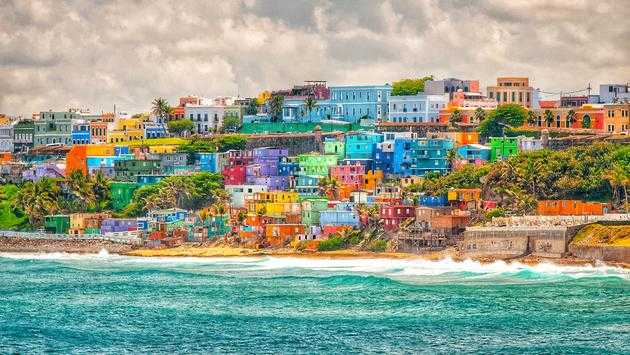


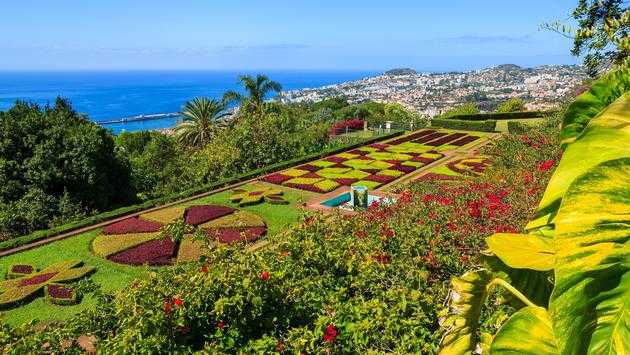

Leave a Comment